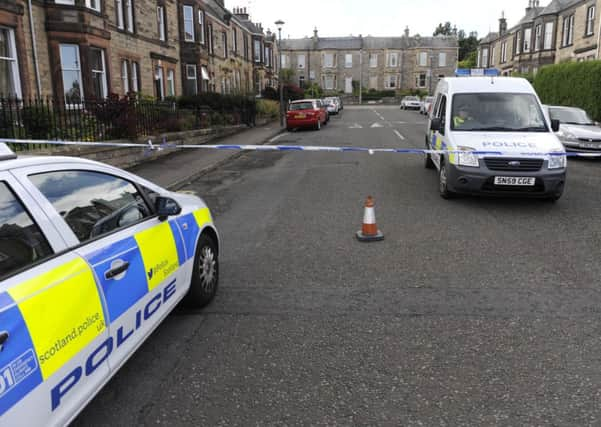Killer Robert Buczek had attacked OAP in Poland


Her killer Robert Buczek, 24, who had arrived in the UK the previous year looking for work, has a conviction in his native Poland for assaulting an elderly woman.
Despite this Buczek brazenly lied in the witness box saying: “I’ve never in my life hurt a woman.”
Advertisement
Hide AdAdvertisement
Hide AdBuczek was also out on bail from Edinburgh Sheriff Court on a charge of having a knife in his possession.
In July last year Buczek working as a labourer at a renovation project just round the corner from Morningside Grove. Mrs Whitelaw’s husband Robert – who is known as Stan – said that days before the murder he saw a young man watching them and their home, but thought nothing of it at the time.
Buczek had finished work at the renovation project, but returned on the day of the attack – July 11, 2014 – to collect wages he was owed.
After leaving there he went to Mrs Whitelaw’s home and attacked her with scissors. She was so badly injured she died in hospital on July 28.
He then callously dragged her along the hallway – leaving a trail of her blood – before ransacking the £500,000 Victorian terrace house in Morningside Grove, Edinburgh.
He prowled the house looking for valuables and managed to leave a partial footprint in Mrs Whitelaw’s blood in the upstairs bathroom before fleeing with a collection of Irish stamps and a box containing spoons.
He left Mrs Whitelaw, a mother of two and a grandmother, who was known to her family and friends as Norah, lying covered in blood and badly injured.
She was found by her husband who had left the family home, which the couple had lived in since 1965, to go shopping around 3pm.
Advertisement
Hide AdAdvertisement
Hide AdWhen he returned about 4.10pm he found the front door locked and was surprised because it was normally left unlocked during the day.
He walked round to the rear of the house and went in the back door. He walked through the kitchen and into the morning room and found his wife lying on the ground.
He said: “I took a cushion and put it under her head because I thought she had fainted after having a nose bleed.
“When I put the cushion down I realised it was more serious. I realised she had a cut to the side of her neck. I called for the ambulance service straightaway. I didn’t go far in the hall because it was full of blood.”
Mr Whitelaw was asked if he had noticed anything unusual before his wife was injured and replied: “Just two days before I saw a young man at the bus stop. He was watching us.”
Buczek was caught because his DNA was found on the murder weapon and on a bottle of Volvic water which he left in the hallway.
Mr Whitelaw helped the police inquiry when he pointed out the bottle to them and revealed that he and his wife never bought bottled water.
Buczek was also seen by two woman and one of them, who saw him running past her nearby home, was able to identify him to the police.
Advertisement
Hide AdAdvertisement
Hide AdThe High Court in Glasgow heard that Buczek took the stamps to a dealer in Edinburgh. He gave a false name Robert Meoczak, but gave his own mobile phone number.
When he discovered the stamps were worthless he threw them away in the grounds of Martello Court in Edinburgh where he lived.
He also dumped the box of spoons nearby.
Police who investigated the crime originally detained Buczek with attempted murder and a sexual offence.
This was because Mrs Whitelaw had a small cut and a bruise on her private parts, but the court heard this could have been caused by a fall.
A forensic scientist also found traces of an unknown male’s DNA on Mrs Whitelaw’s thigh when she was examined in hospital on July 12, last year.
But prosecutors believe that this came from a member of medical staff who treated her not wearing gloves.
Throughout his trial Buczek denied murdering Mrs Whitelaw and claimed he had never been in her home or spoken to her.
The only clue as to why he carried out the killing came when his defence QC Brian McConnachie told the jury that Buczek had a gambling addiction to fruit machines.
Prof Bruce Whitelaw of the Roslin Institute in Edinburgh, where Dolly the cloned sheep was created in 1996, is Mrs Whitelaw’s son.